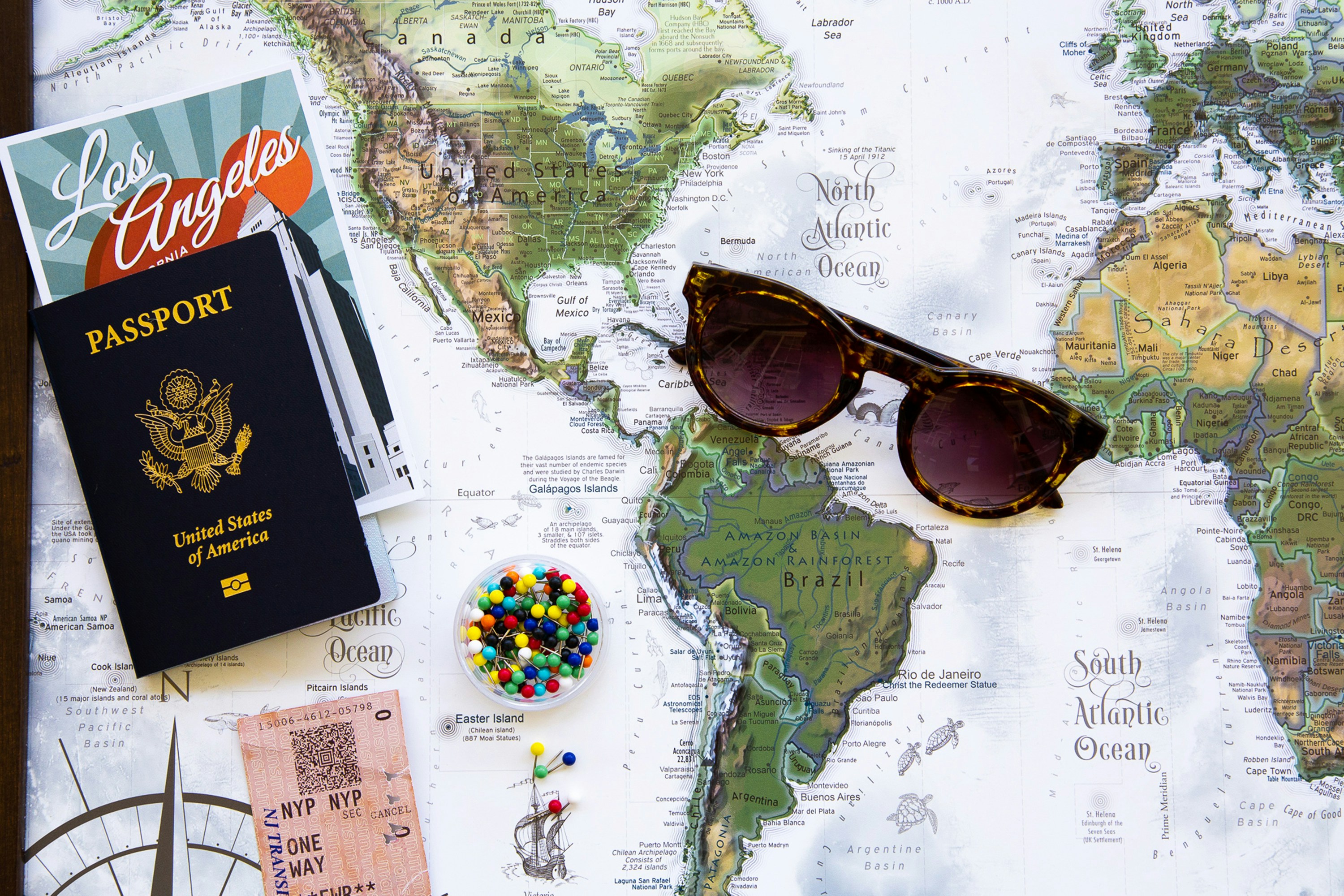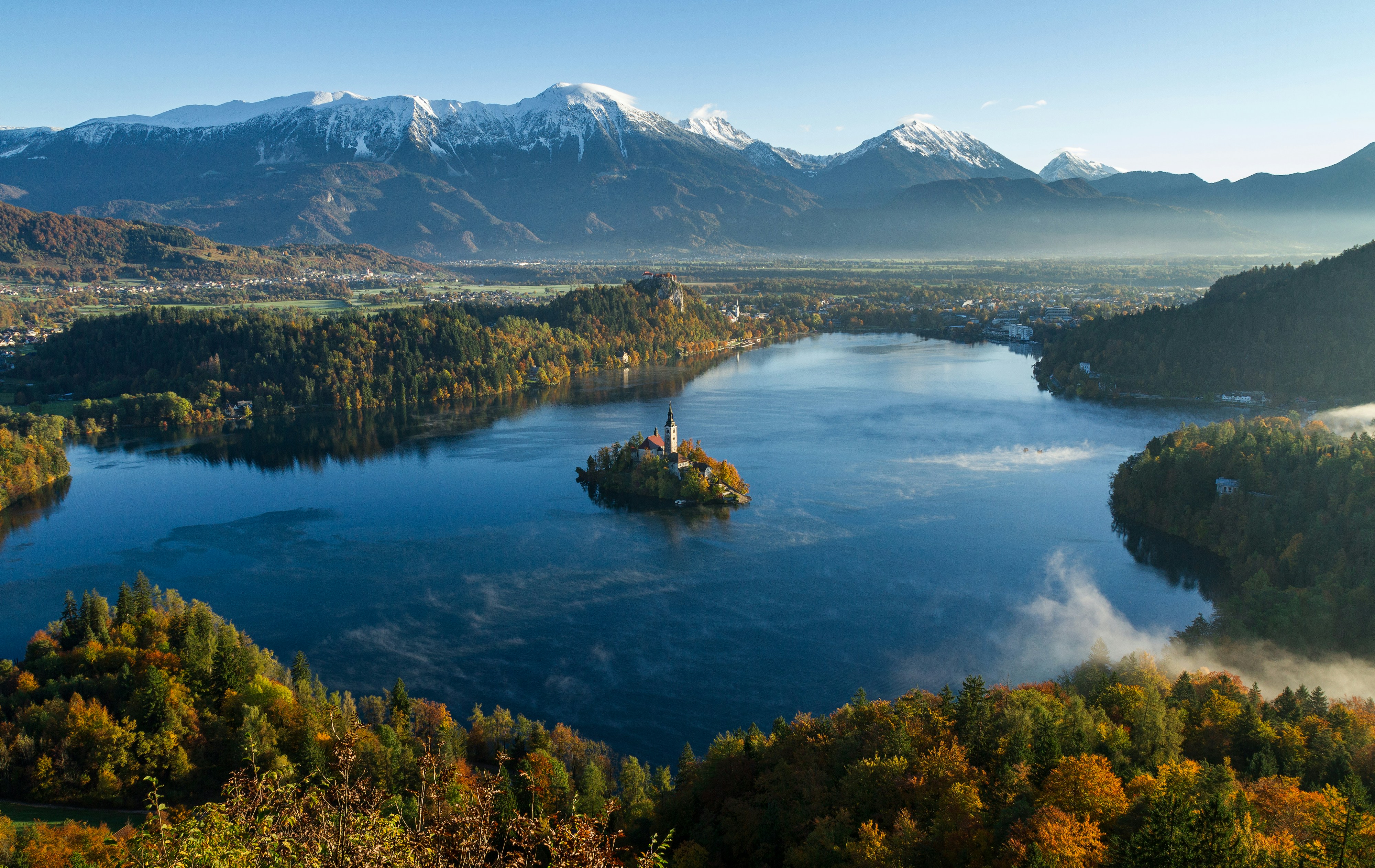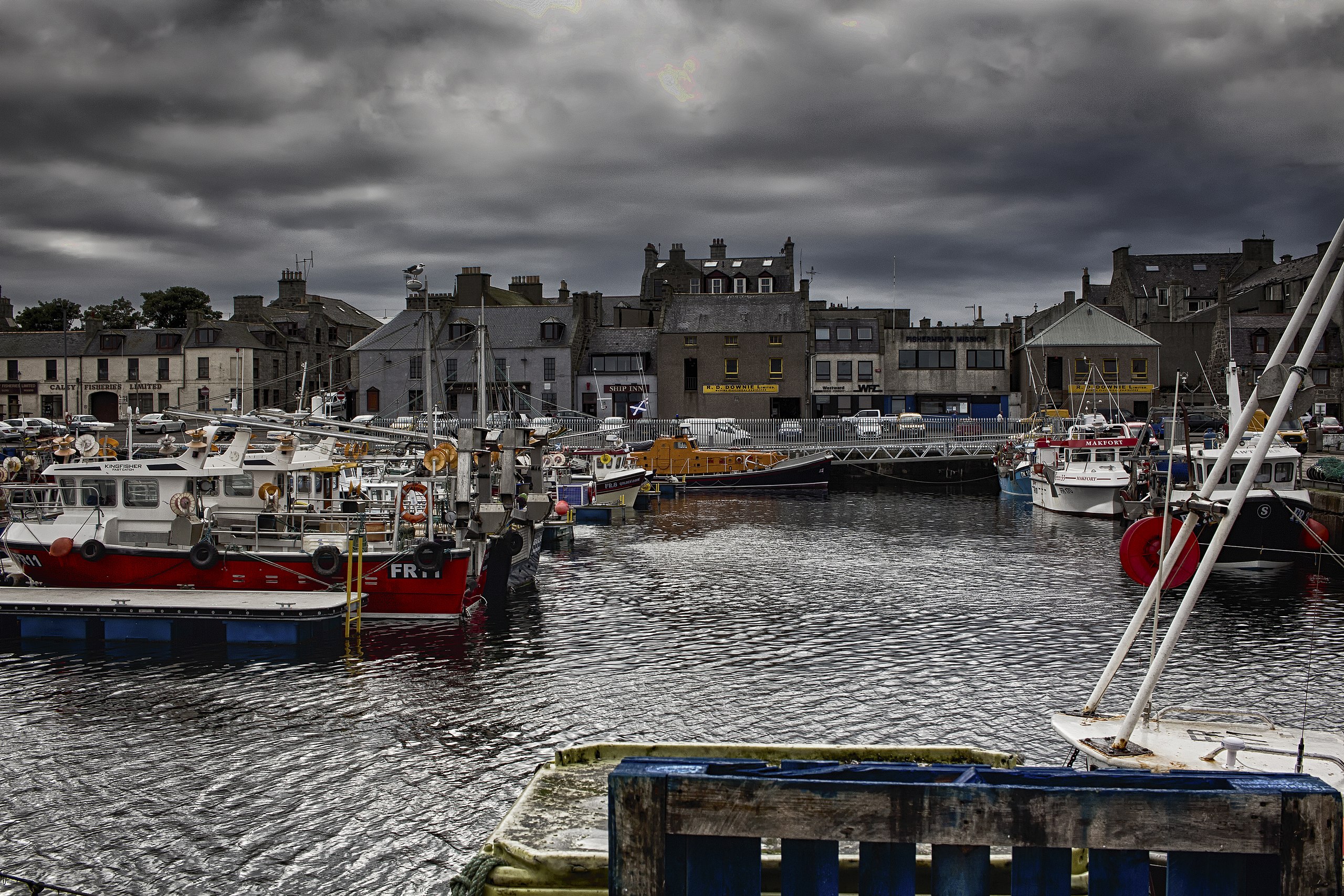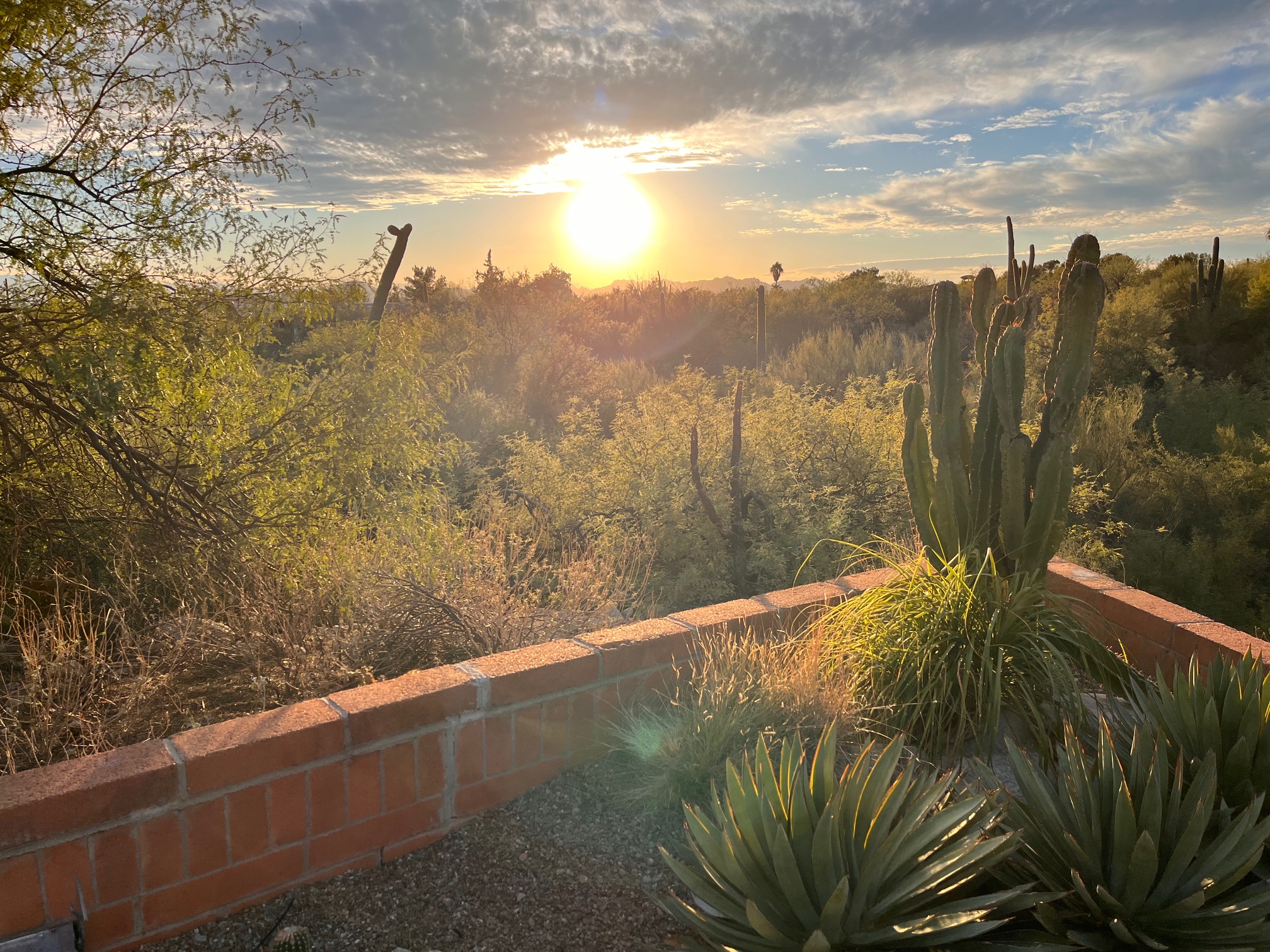Nostalgic Nomad: A Sojourn, America Story
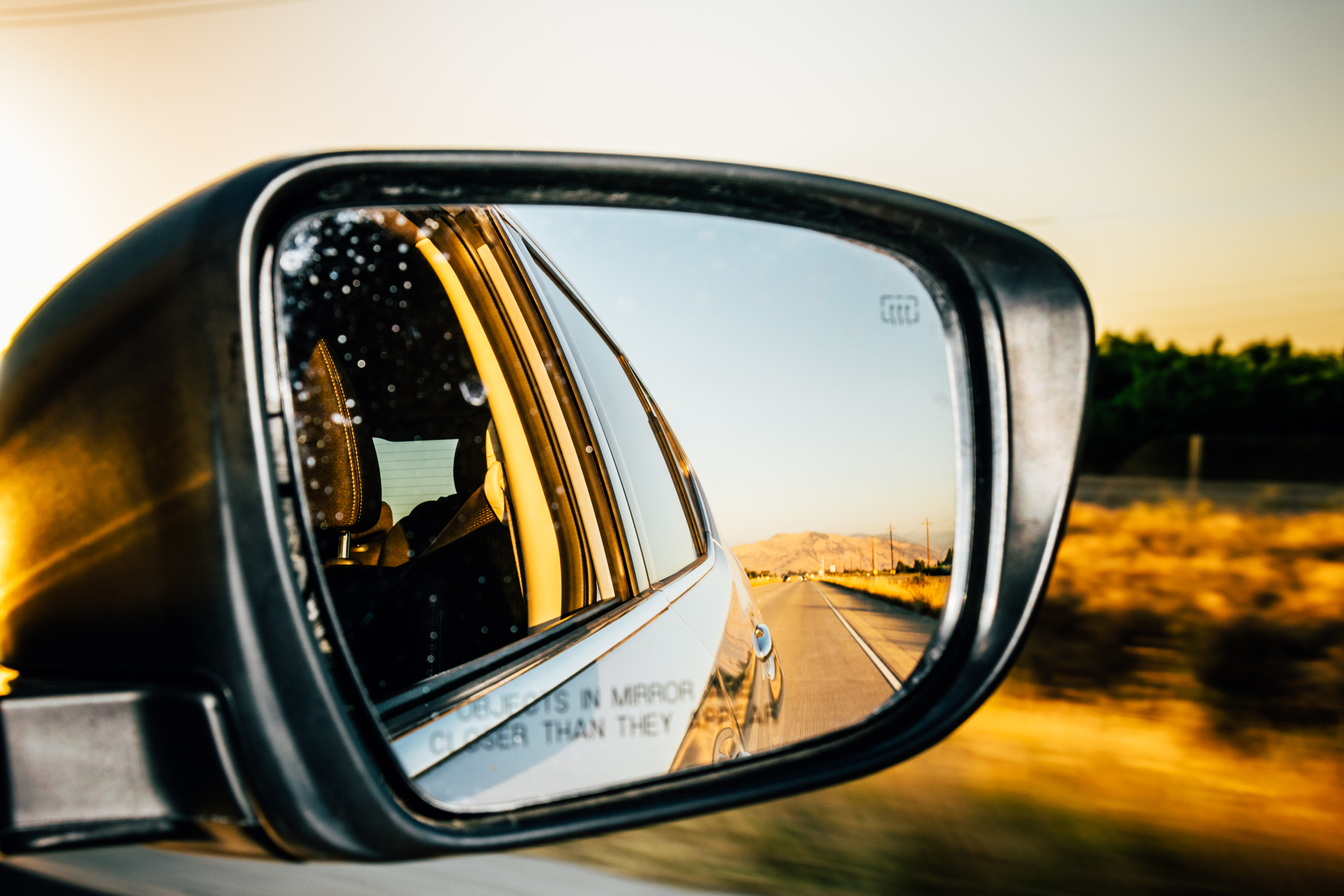
By definition, trauma is something that happens TO us: a deeply distressing or disturbing personal experience, or a severe injury that causes significant harm. I believe much of the trauma we experience occurs due to circumstances beyond our control, and sometimes because people do things that cause us harm.
We are not responsible for the things others have done to cause us trauma.
And, in my experience, one of the problems with trauma is that it stays with us, often putting us on whole new trajectories. Altered pathways and rerouted journeys that we simply would not have had to traverse, were it not for those traumas in the first place.
Another problem is that sometimes the people who cause our trauma are people whom we are in relationship with, sometimes those closest to us, whom we trusted the most. Which makes healing more challenging.
Often, our trauma blocks our memories of our past, frames our view of the present, and limits what we can imagine.
And sometimes, as we gaze upon the physical and emotional scars of these traumas, as we begin to heal, we may realize these scars indicate more than just past hurts, they might also help us make sense of our futures. I know this has been true in my life, and I wonder if it might be true for us as a society.
Looking Back At A Life On The Move
Fall always begins the nostalgia season for me – the nostalgia of my nomadic life, as I have come to see it. However, lately I’ve noticed that I’m struggling to remember the details of various scenes from my childhood. As far as I can tell, this is less likely due to an undiagnosed neurological disorder, and more likely due to simply having too many details to remember.
See, we moved around a lot when I was a child. I mean, A LOT.

I don’t remember all the places we lived in, not in detail. When my peers say things like, “I remember my landline growing up.” I think to myself, Landline? I can’t even remember a street number and name, let alone a landline…
Why did we move around so much? It’s complicated. It’s largely because my father was abusive, and an alcoholic and a gambler and we repeatedly had to leave. It’s also because my mother was a minister, and for much of her journey, she pastored very small congregations, and therefore we struggled. We were always dependent on friends, church members, my mother’s cousins and aunts, other formerly-estranged family members… It was a very difficult way to live.
But there is more to it than that. Much, much more. You see, we were wanderers, and I think my mother was a wanderer long before she met my father or had my sister and me. I now think wandering has been in my emotional DNA all along.
But that’s a very recent realization – I didn’t always know that. To understand why and how these experiences shaped me with both pain and purpose, we have to understand all the places I’ve lived – and the reasons why I’ve moved so much.
It starts with the search for a place to call home.
But what is the meaning of home, when there are too many homes to remember?
We’ll start with when I was in kindergarten or first grade (I can’t quite remember which), and my dad was a doctor in the army, stationed at the VA hospital in Brooklyn. We lived at Fort Hamilton and I went to P.S. 104 in Brooklyn, until one day we didn’t, when my mother, my sister and I had to leave because of the abuse. This was my parents’ first separation that I recall, though I don’t remember how this transpired. All I know is that when I close my eyes on Fort Hamilton and open them, we’re living in New Brunswick, New Jersey. Division Street, I think? My Aunt Elma lived with us during at least part of this time, and I vaguely remember other places where we lived, briefly, in Piscataway and Teaneck and Englewood and North Brunswick.
Then a parental reunion, and we’re off to Michigan, with a dream house in Ackerson Lake and a reset for my father’s career as a doctor. Maya and I used to do our homework on our parents’ bed listening to their clock radio. I joined the boy scouts. Life was fun and felt whole for a brief while.
Then lots and lots more abuse and alcohol, oh, and this is when I remember learning about my father’s gambling problem. Because that’s when he apparently put the deed on the table during a card game and lost, at least that’s the way my mother told us the story. We had to leave again.
Then I remember Jackson, Michigan. Where I learned to be a gardener thanks to the nurturing hands of Mother Fletcher, our next door neighbor.
Then there was another parental reunion, and now we’ve moved to Tulsa, Oklahoma, for my father’s third and final attempt at a medical career, at Oral Roberts University (ORU) and the City of Faith medical center. I think I was in 4th grade.
I also think this was when my mother first felt called to return to her musical gifts, now through ministry. And while I was proud of her for starting her own path, and even now, knowing all the struggle she and we endured in part because of that choice, I can’t help but wish things had been more stable for us – in large part because overall, Tulsa was a disaster when I look back. This is when the wheels really came off.
We had a nice house at first.
Then Dad couldn’t keep the job because of the drink. And we had to move again, but I don’t even know where we moved to at that point. I believe Mom started teaching music at Oral Roberts University, and also started ministering at a small church.
The next two years were a blur of homes — barely furnished – a short stay in Broken Arrow, a stint in a homeless shelter, an apartment for ORU grad students and faculty. Another apartment townhome where I remember a neighbor my age who had a problem with violence.
During this time, I also had a brief stint as a child preacher! That’s right. I started preaching in churches and even traveled to New York after a pastor from Brooklyn visited Tulsa one time and heard me preach. He wanted me to come to his church and speak. So I did. I think I was 11 or 12? Hard to say, exactly.
Anyway, we finally wound up renting a friend’s very large home in Tulsa for a very friendly rental amount. That’s the place where the worst domestic abuse and violence that I saw took place, which I talked about in The Hopeful Way. So when we left that house, we left Tulsa for good.
But the moving didn’t stop there. Mom said it was time to return to New York and New Jersey, the place she viewed as home. She told me that my “child preaching tour” of Brooklyn and Manhattan was a sign that I had “gone before the family” to prepare the way for our return. She always saw life in spiritual terms.
I remember at one point in Tulsa we acquired an old blue Plymouth Valiant sedan. It was remarkably well cared for when we got it, but it was also very, very old. I remember I could always run my fingers between the torn fabric covering the back seat and poke holes in the orange seat foam (which I doubted was the original color). We packed that car one day and drove it from Tulsa, Oklahoma to New York City in the winter, with the heat not working very well. Just Mom, her friend Nancy, Maya, and me. (I often wonder how hard that might have been for my mother, making the move and leaving behind what turned out to be the last touchpoint we’d have with my father before he died years later. Did she know deep down she was leaving him forever? Was she finally choosing our safety and security over any lingering hope that some sort of holy matrimony might actually be salvaged out of the unholy mess he had made?)

Houses of Faith
We arrived in New York, and the next year or two was another blur. Staying with my mom’s cousins on Riverside Drive. Then heading to New Jersey again, I think, and staying with my mother’s Aunt Elma again for a while in New Brunswick. This is when I first heard Prince’s Purple Rain, the artist and the album that have been my companion for the past 40 years. (Staying with my mother’s aunts became a theme during childhood, from New York to New Jersey to Maryland to Virginia. Thank God for aunts.)
From New Brunswick, we traveled to Richmond, Virginia to stay with my mother’s cousin, whom I called Aunt Rowena, for a bit. And then my mother took us to Ashland, Virginia to be part of a Pentecostal church camp-meeting. Which stretched from the spring to the summer to the fall. I don’t have many good memories from that place.
And then one night, in the middle of the night, we left that place to head to Providence. We stayed with friends there in two different places, for reasons I don’t know. Then we moved back to the New York/New Jersey area again – “home” as it were. We hopped around again. In Piscataway, NJ, our church friend Mom Morgan helped take care of us during the summer days while my mom worked. I remember how much Mom Morgan loved her soap operas and how the back of my legs got sweaty on her plastic-covered sofa.
At some point in here, there was a brief stint in Baltimore. A stay with my mom’s Aunt Ella in Lanham, MD. A short stay with mom’s Aunt Lily in Burkeville, VA. I wonder what Mom must have been thinking as we wandered from place to place. What was she searching for in her faith journey? What was she running from in her own past? I’m not sure, but these days were haunting, full of uncertainty, doubt and fear for me. Again, thank God for aunts.
I think after that sojourn, it was back to New York City, finally.
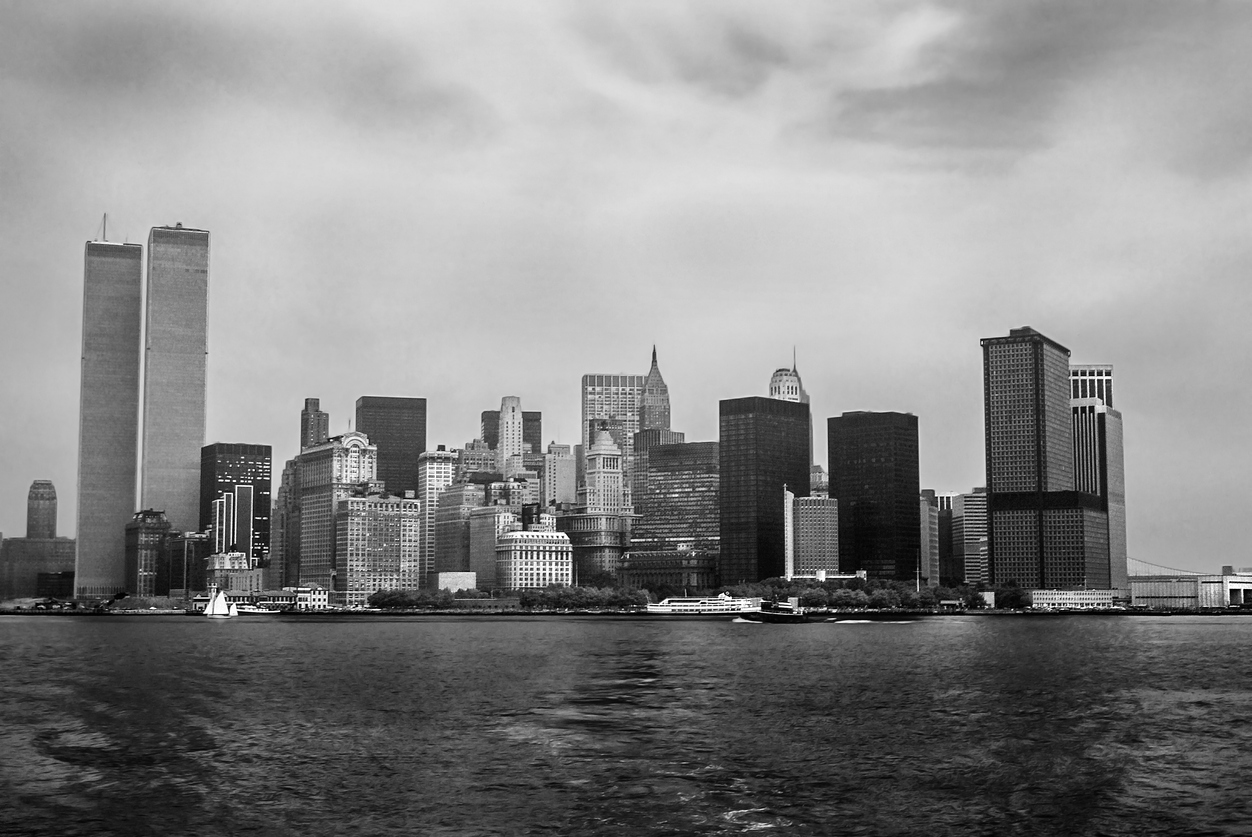
My mother started working with a ministry (everyone called their operation a ministry back in those days), the very same one that brought me to New York to preach a couple prior. They held their church services in the Doral Hotel in Manhattan, And we lived with my mother’s friend whom I called Aunt Doris, in Brooklyn. I think on Ocean Avenue? It’s hard to be sure.
All this time, I was homeschooled, more or less. I treated this as escape. Maya hated it.
I remember this is where we were living when the Challenger Shuttle exploded shortly after takeoff. I’ll never forget hearing it on the radio at a newsstand or a corner store, as I walked back home from picking up groceries for my mother. Eventually, my mother started her own church and we got our own place in Brooklyn. This place I do remember! St. Felix Street opposite the Brooklyn Academy of Music. (My mother saw more symbolism in that proximity, as this was a place she had performed at when she was an opera singer in New York and in Europe, years before she met my father.) I remember having church services in our living room.
This was a deeply traumatizing time for me. We were quite literally thrown out on the street. I remember the terror and panic that gripped everyone as the loud knock on the door was immediately followed by keys in the front door – not our keys. It was eviction time again and this was the one that hurt the most. I remember my mother begging the sheriff and the landlord to give us a little more time, to no avail. The landlord started cussing her out and started to take our things outside, and the sheriff did intervene at this point and told him he couldn’t touch our belongings. This was the worst. This was one of the times I felt deep hatred towards my father, whom I also loved.
I don’t recall when we traded in the old, trusty Plymouth Valiant, but I remember by this point we had an old gray Cadillac – a BOAT of a car with AC that didn’t work. And I remember packing that trunk and the back seat with as many of our things as I could possibly fit. Because the rest would stay locked up – padlocked – in the house until we could come back and get it. We called some of the church friends to come over and help. And after we got what we could, I remember the three of us – Mom, Maya and me – sitting in that old gray Cadillac and we had a good, long cry.
(And whether it was due to eviction or fleeing abuse, I became very good at packing the trunk of a car. So good that now, any time we have to take a trip, I designate myself as the official luggage packer. I’m also good at packing moving trucks. I can see how things fit when others can’t. It’s a skill I acquired due to the many, many moves.)
We stayed with a few different church members. I remember a short stint in Brooklyn. Then living with friends in the Bronx. I remember Parkchester, and I think by this point, I would’ve been in the 9th grade, and I wanted to go to school. My mom enrolled us in a school in the Bronx run by another church group. It was a short experience. I made a friend who encouraged me to stop introducing myself as Jimmy and start going by James. And I remember we eventually had to leave the school because she couldn’t keep up with the tuition.
Finally, my mom got connected to a relatively new congregation in New York, Times Square Church (TSC). She continued to pastor her small church but also joined the staff of TSC. Eventually the small church dissolved and most folks started attending TSC. I remember these early days after my mother joined TSC’s pastoral staff, with much fondness, as this was the first time we’d experienced home stability and security in years. This also felt like the spiritual home she had sought for us for so long.

We got a place on the Upper West Side on 106th street between Broadway and Amsterdam. I wanted to go back to school again and that’s when we found Dwight School. The headmaster at the time, Stephen Spahn, took a liking to me instantly and also saw a very unique value in my upbringing and journey. (I’m glad someone did, ha!)
We later moved to 55th and Broadway, where we remained while Mom continued to serve at TSC. Then came another breakup, this kind of the church variety. We found ourselves one day no longer part of TSC. And while these happen from time to time, I could tell how much this hurt my mother. Still, she soldiered on.
Mom started another church fellowship in Manhattan. And thus started another series of moves for her and us. Now, to Queens!
After a period of time, she became part of Allen AME Church, which was another homecoming of sorts given her family’s extensive history pastoring and belonging to the AME Church. Allen AME, along with Nyack College I think, were where she continued to serve until she was physically no longer able, due to gradually worsening chronic illnesses.
The Wander Years
In these intervening years, I graduated high school; went to college in Princeton and got bad grades; went to Centenary College in Louisiana where I flirted again with the idea of going into the ministry myself, thinking I’d become a youth pastor for a minute; moved back to Princeton and started working at Times Square Church in NYC; then eventually moved back home to Manhattan to attend Columbia University and live with my mom and sister. I moved with them when they moved to Forest Hills Gardens in Queens, where I lived until I got married the first time and my wife and I got a place of our own.
(Fun fact about Princeton: my mother lived there as a child, when her father pastored a small church near the University, Mt. Pisgah AME Church on Witherspoon Street. When I lived off campus in Princeton during my sophomore year, I was just a few blocks from where she had lived as a child. And I lived in an apartment below two elderly sisters in their late 90s who had been close friends of my grandparents and helped raise my mother when she was a small child.)
My then-wife and I got our first apartment in Queens where we welcomed our first son together.
After a couple of years, we decided to leave New York and move to Princeton, of all places! This is where we lived together for a short while, until I decided to move out because I didn’t want to be married. I didn’t want to be responsible to my family. Here I was, inflicting some of the same traumas on my family that my father had inflicted on his.
For the next year or so, I bumped around NYC staying with friends, a roommate in Brooklyn here, a roommate in TriBeCa there, living my best worst life. My former wife and I had already separated and I was living in New York CIty, staying with friends, finally running out of places to stay and borrowing $4,500 for a short-term furnished apartment on the East Side — anything to avoid moving back in with my mother, who was still living in Queens (although she was still moving to new places every couple of years; no major drama that I can recall, but she had a knack for signing leases with fixed end terms – no renewals).
I remember a New Year’s Eve – might have been December 31, 2000 – when I was alone by myself in NYC after a celebratory dinner with my best friend, his girlfriend and her sisters and their dates. After dinner, they all went home. I wandered the streets of NYC. Scared and lonely. I finally went back to my short-term furnished apartment (if you could call it that) littered with pizza boxes and Chinese takeout containers and on the next day, New Year’s Day, I went to the movies by myself. I think I saw Traffic.
Eventually, I did move back in with her in Queens until I could get back on my feet, and get an apartment in the City with a new roommate, a good friend of mine. (It was rough living with Mom again, but I had no other choice, and hey, that’s what parents – and Aunts! – are for, right?)
I95, Our Very Own Personal Highway
I eventually moved to Richmond for my career. I remarried and began establishing the next chapter of my life in Richmond. I had to go back to New York a couple of times, once to see about my sister. And then again to move them both move to Richmond.
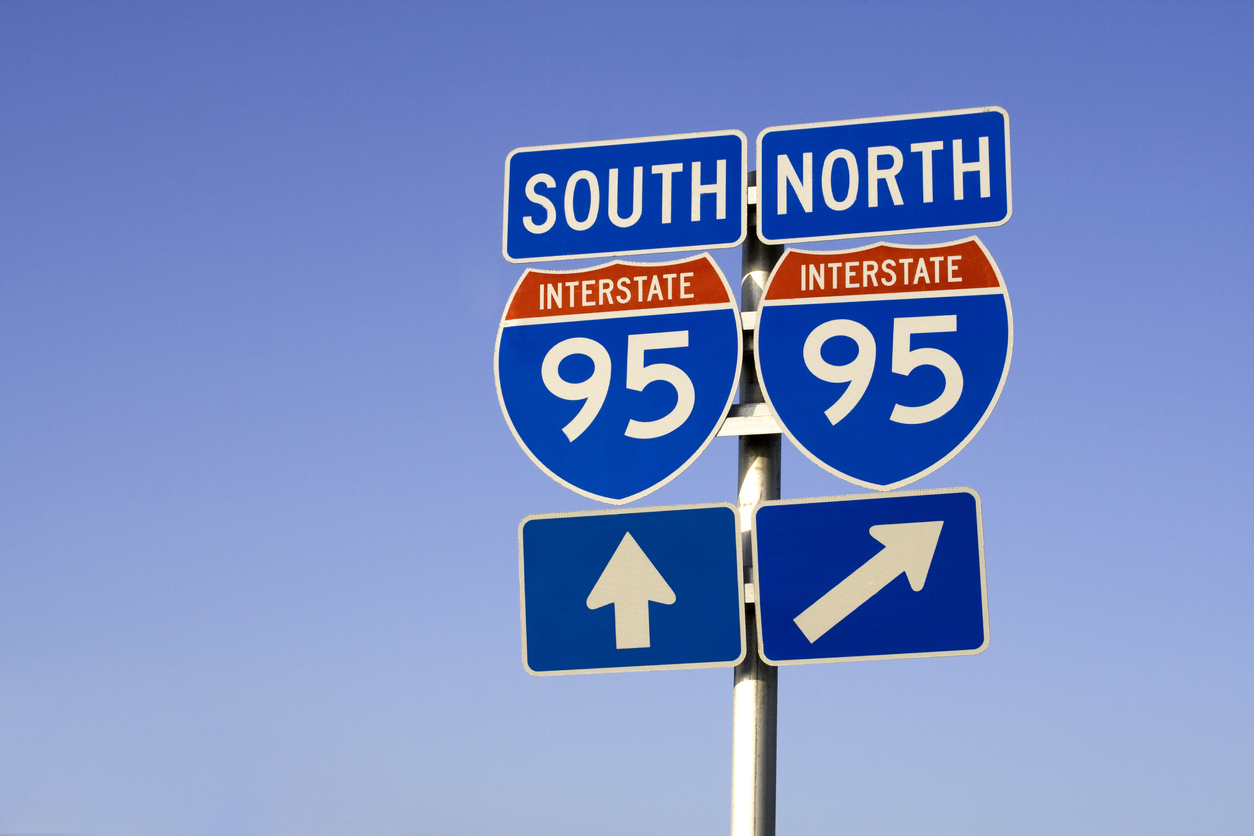
This was a full circle moment. New York to Richmond. Again.
I brought them both home to Richmond. Maya came to live with us, and we rented an assisted living apartment for my mother close to our home, but eventually she needed a different level of care due to her illnesses. The next few years were a long struggle, in and out of skilled nursing homes and retirement, and long-term care facilities, until we eventually found the perfect place, Beth Shalom Home, in Richmond’s West End.
By this time, my older sons who were still living in New Jersey with their mother unfortunately had already started to experience their own version of the Warren Family Transitory Housing Experience, when they lost their home in Princeton due to a fire in an adjacent dwelling. They themselves moved a couple of times in a short time frame, uprooted from school just as Maya and I had been all those years ago, and eventually the three of them — my sons and their mother – moved in with their grandmother. I struggled with this mightily, both because I felt partially to blame since I was the one who had left, and because I knew this would be traumatic for them.
Eventually, the boys moved to Richmond during the latter part of elementary school. During this time, Maya also stayed with us for a year or two, and for a while, it was all of us – Darcy, the boys, Mom, Maya and me – together in Richmond.
Maya gradually got on her feet, got her own apartment, restarted her legal career in Richmond. Her first place was a cute little apartment in Stony Point with a pond, and the boys absolutely LOVED going to spend Friday or Saturday nights at TiTi Maya’s, because she would spoil them in the way that only Aunties can.
I remember in the spring of the year before things got really bad for Mom, Maya was hoping that she could have Mom move in with her. But Mom’s care challenges were too complex. The good news was that Beth Shalom Home was able to take good care of Mom. I remember I used to think it was so inconvenient for me to get out to see her frequently. Of course I’d give anything to go back and see her every day now, if I could.
A Homegoing in Richmond
Things for my mom took a hard turn for the worse after a hospitalization at St. Francis – she loved that place – revealed an advanced stage of her chronic illnesses, with no hopeful prognosis of any kind. She was too weak for surgery and the likelihood of success was low anyway.
I remember a care coordinator sat Maya and me down one day at the hospital and asked us if we had considered “palliative care” yet. I hadn’t even known what that meant until then.
There was a lot of praying, thinking, talking, researching and consulting with doctors. Our mom had graciously taken some of these decisions out of our hands with her living will and advance directives, but still it was a shock to process things like DNR – do not resuscitate – as we contemplated that she might take her final breaths in months or weeks.
One day, she sent the family away and asked me to stay and talk. She said she didn’t want to prolong things and she was ready, and that it was okay for us to let her go. There were a lot of tears and this was my last meaningful conversation with Mom.
There was nothing for Maya and I to do but to honor her wishes, so we decided hospice care at her home in Beth Shalom. We thought we had months, it turned out we only had a couple of weeks. Things went downhill fast, and she shrank before our eyes. I made CDs for her, of her favorite gospel songs and hymns, and played them on repeat in her room.
I remember the people who cared for her at Beth Shalom during those final days; they were so loving. So many different backgrounds, different walks of life, united in a shared focus of caring for my mother at the end of her life. Wondrous.
For me, there was a lot of talking to God those days, and also getting into project manager mode. I had a spreadsheet for navigating her funeral arrangements and I took time off from work as it became increasingly clear that we were down to the final few days.
My sister, my wife, and I fell into a pattern of taking turns being with my mother, as family and close friends came to visit with her one last time before she transitioned. She was pretty much unconscious at this point, and her breathing had become less frequent, uneven, uneasy. We could sense we were at the end.
On the day when Mom finally transitioned, Maya and Darcy were already at her place. The boys and I were on the way and I was picking up breakfast for everyone. We got there and my wife was rushing out to meet me in the parking lot, to tell me that she had just passed.
We ran in. And sure enough, my sister greeted me and said. “Mom is gone.” I fell into her arms and she held me and I wailed. I could not believe I had missed saying goodbye by mere seconds. My heart filled with guilt and sadness. However, my sister would later describe with great reverence the experience of being there for our mother during her last breaths, singing softly to her, and praying by her side for safe passage as she left this world and went home to be with her parents and the ancestors. And I have come to think of that as the perfect way, and I no longer wish to change that.
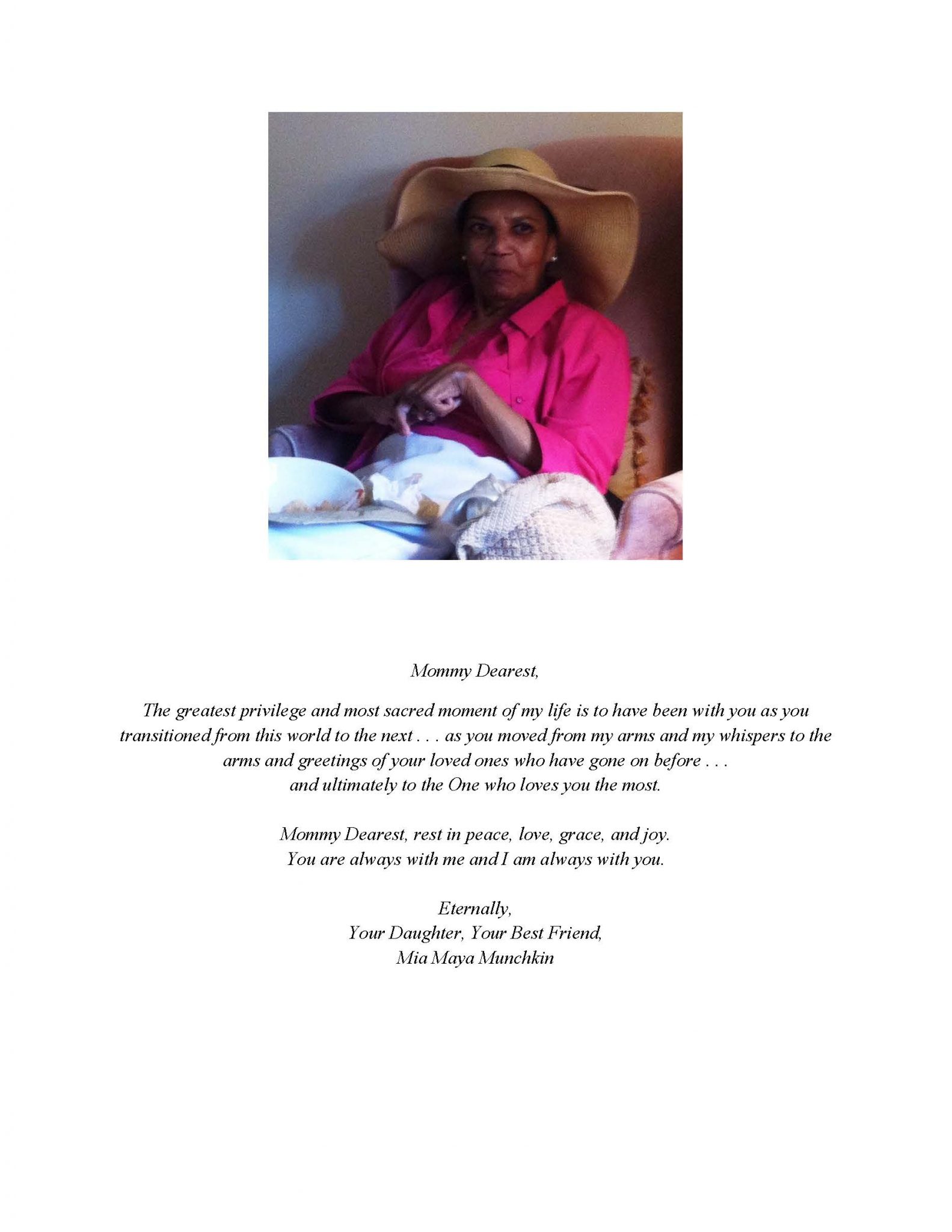
Tragically, one of the people she had served with in ministry decades previously called us after news of Mom’s death reached him, to tell us that he thought the hospice decision was akin to murder. I told him never to speak to us again, but the damage was done and my sister was devastated by this. All the way until her own death, I know my sister bore the burden of a guilt she didn’t deserve, but one thrust upon her by another. Funny, the messages that messengers of God sometimes deliver.
But not all messengers are the same. Thankfully, it was the same wonderful Rev. Alice Harris that we met at the wonderful Richmond Hill, who married Darcy and me in the first interfaith ceremony that she had ever officiated, who was willing to make her wonderful church available and preside over Mom’s funeral, because we didn’t really belong to a church, and that seemed to be a requirement in many of the scenarios we investigated.
Several ministers and pastors who had served with her in New York City at both TSC and Allen made the trip. Many of my colleagues and teammates came to the funeral. And of course, the family was there.
My mother didn’t have anything saved up, and so it was all pretty much on me and my wife, and my sister. We didn’t have much of anything, either, but my sister wanted things a certain way, and I figured what’s a few extra bucks if it makes her happy at such a pivotal moment, so we dipped into our savings.
My sister and I designed the service together, wrote the program and I planned the eulogy. I made DVDs for the funeral home and for posterity. I remember it kept getting stuck at one point in the slide show.
One of the things that has stuck with me over the years, looking back at that time of my life, is just how much damage people can do to each other in the name of God, and yet what good things can also come when people are gathered together in a House like that. I looked at the people sitting in that church when I gave the eulogy. It was such a diverse crowd. Most had probably never been in a church together that way because we continued to experience religion in mostly segregated ways in this country. (But that is another story for another day.) That day was the first time in over 15 years that I stepped foot in a pulpit, and I figured it would be my last. While it was nothing like the short-lived preaching days of my youth, it did feel familiar. And I’m positive my mother would have been beaming with pride, as she really, really, REALLY wanted me to be a minister, as she was, and her father was before her. Of course, as it turns out, there would be one more time in a pulpit, when I would have to deliver the eulogy at Maya’s funeral nine years later.
Home On The Run
Less than a year after Mom died, I was out of my corporate job, and excited about starting a new career as an entrepreneur. And just one year after that, my son Christian graduated high school and moved back to New Jersey to live with his mom and grandmother, where he’d eventually start college and start working. We’d had a falling out but within a year started to mend, and after a period of time, Christian began returning home to Richmond for frequent visits during the holidays and summer breaks.
Even after Mom’s death, and in no small part because Christian found his way back to Richmond frequently enough, and because Maya continued to live in Richmond, Richmond remained home. It’s where Darcy and I have raised our two younger children. And it’s where after college, after flirting with the idea of moving to New York for school, my son Jordan decided to stay and attend VCU.
Maya shared the same restless quality that our mother had, though. Much like our mother did when we were younger, Maya moved around a lot in Richmond in her nearly 15 years here. Again, no particular drama and all were moves primarily of choice, not force. But she was always looking for the right home, for home to feel right. She moved so much I don’t even remember all of the places she lived. I found it hard to fathom these decisions, and I judged her for it. To the point where, when she died, I thought she’d only been living in that place for a year or so. I had never visited her there apart from a visit during a Covid Christmas where we exchanged gifts in the parking lot. Turns out she had lived there for three or four years when she died.
I wish I could go back and visit her, too.
When Jordan graduated from VCU, Darcy, the kids and I were all sick at home with Covid so we couldn’t attend his graduation. Maya was sick as well. I hate that we missed his big day and that Maya missed it. After all, she had invested so much in those boys during their elementary school years, being the true Auntie while she lived with us and afterwards, helping guide them, nurture them, tutor them, you name it. They were the apples of her eye, indeed. Interestingly enough, Christian is now planning to move back to Richmond in the near future where he’ll take the next steps of his life and career. I think Maya would have enjoyed seeing that.
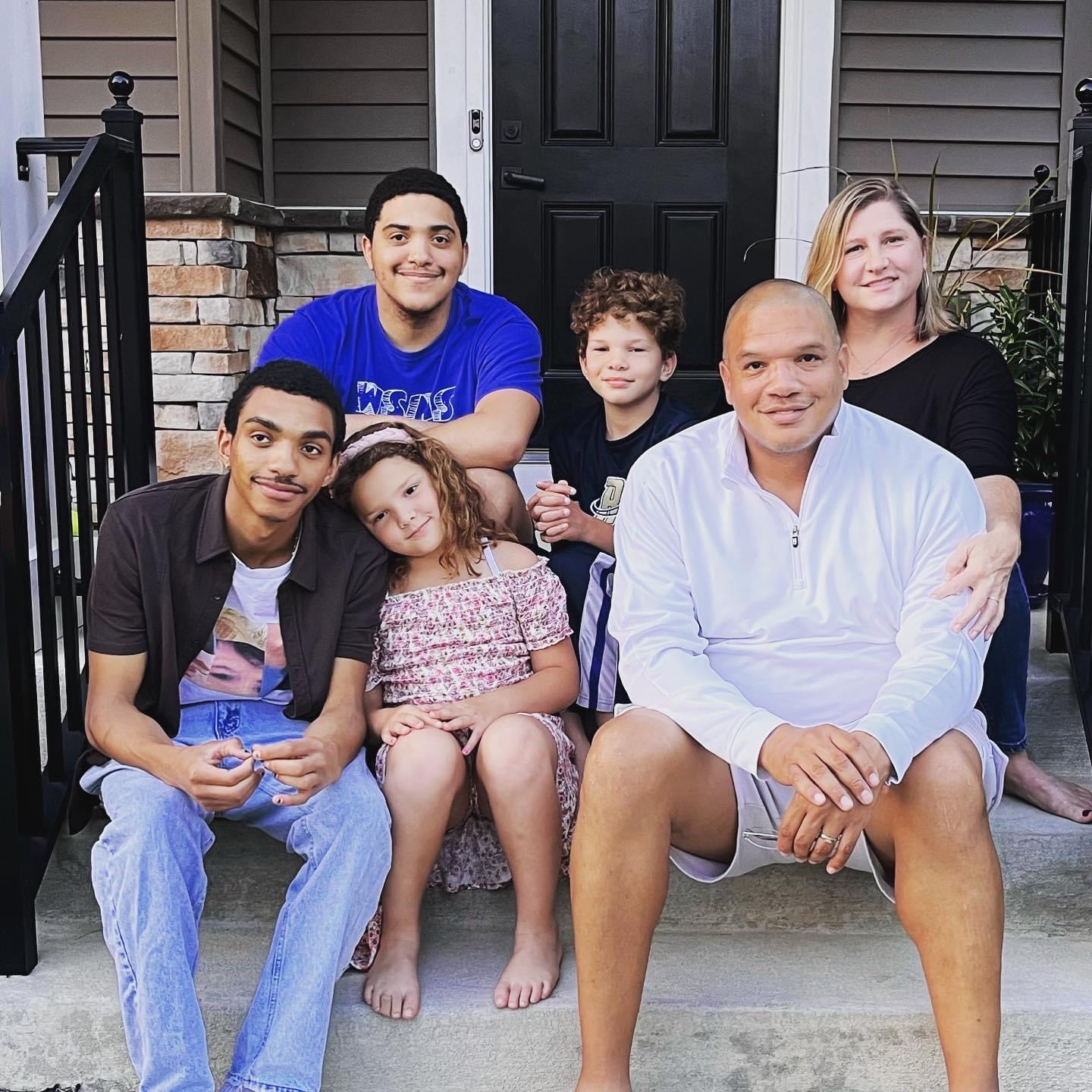
It’s funny how this has all worked out, with Richmond becoming the family home, and it makes me wonder: why have the NY/NJ area and the RIchmond Region played such central roles in our lives over the past 40 years, across three generations, and through so many challenging life circumstances?
Why did we traverse this stretch of highway on I-95 so much over these years? Where was the center of gravity for our family all that time? Well, I always thought my mother was our center of gravity. As it turns out… it was… kind of… me. Which I am not entirely prepared to accept, yet.
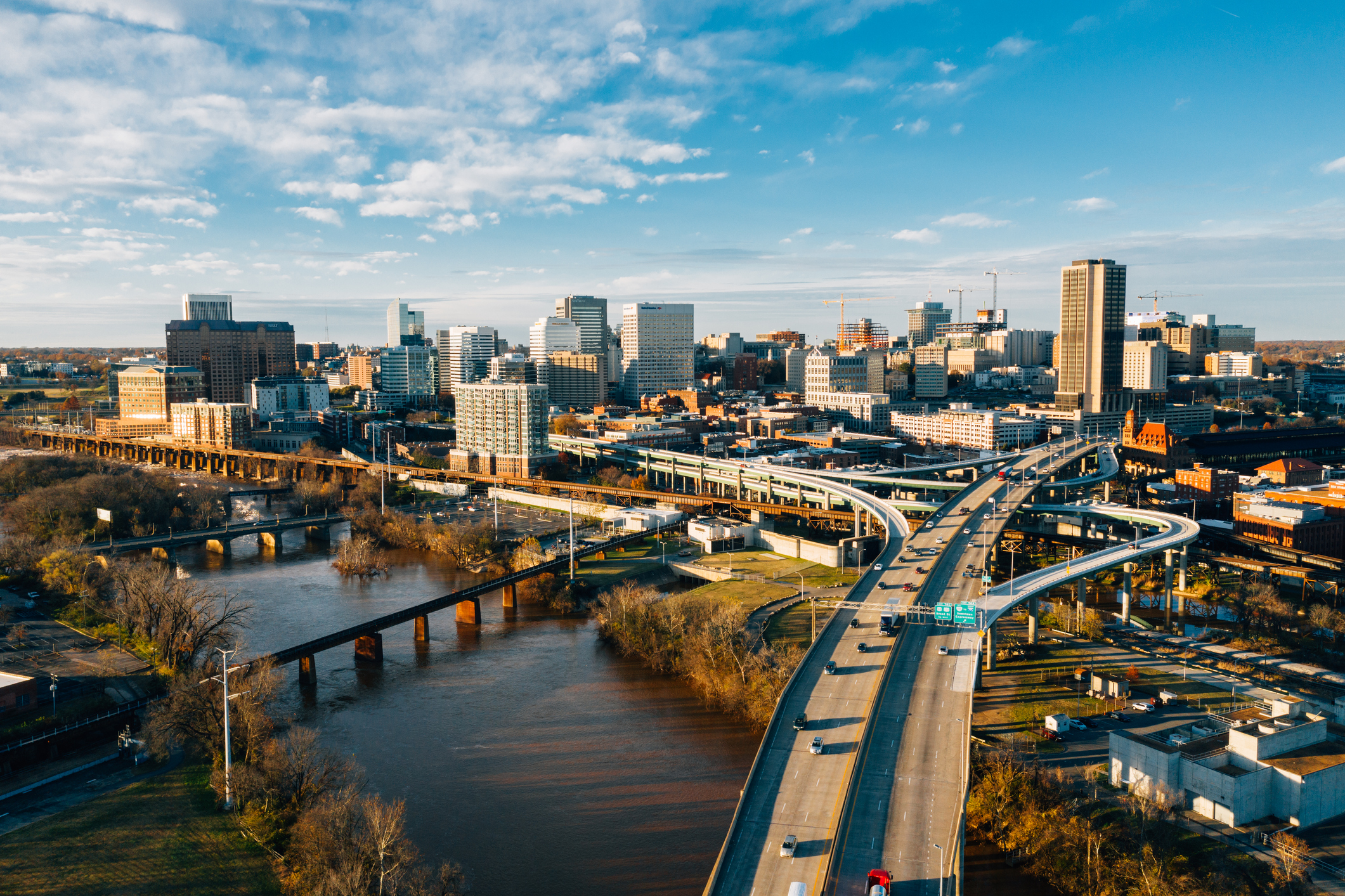
Sense-Making from Place-Making
So I was discussing all this with my therapist recently. I was casually remarking about the fact that as much as I loved helping others explore their own travel experiences through our company’s work, and as much as I loved helping make travel more inclusive and welcoming for people, I was somewhat reluctant to travel much myself at this stage in my life. I didn’t understand this paradox. I’ve always obsessed about not having enough roots. For some reason, I jumped from that story to reflecting on some of these way-too-frequent moves as a child. And she saw the connection I had missed all this time. She exclaimed, “James! You’re a nomad! You are FROM NOMAD!”
And I felt instantly seen. I was a nomad. And in my core, that felt right and accurate, and affirming. And I realize now, that this journey has absolutely shaped my views about three things in particular:
- My understanding of travel, place and home
- Death, religion and spirituality
- How we heal as a community and as a society
My New Understanding of Travel, Place and Home
All those years of traveling in shame, of packing up cars under duress, of being forced out of places.. Yes, they were deeply traumatizing. I would not wish them on anyone. And, they are the seeds of so much of my purpose today. They are why I desire to create belonging places and spaces for people – emotionally, psychologically and physically.
So much of these travels accompanied deep pain, but so often, the arrivals at destinations were places of respite and restoration – either temporary or longer-term. But never permanent. Nomad.
I am clear-eyed about this: it was not good for me that I experienced all of these traumas. They are not beneficial to me, as some would have folks like me believe. I’m not necessarily proud of this resiliency, but I am certainly grateful for it, because I am still here – and it doesn’t always work out that way for everyone. I think being constantly on the move is one of the reasons why I always told myself I would be most comfortable staying at home; why I always want people to come “here” rather than going “there.” Because when I was young, I didn’t have much “here” to call home, and there was always a lot of going “there.” I also realize now that part of my path is laying these traumas down at the side of the road one emotional mile marker at a time, as I continue to journey with others.
Death, Religion and Spirituality
Through these experiences, I’ve come to process the death of all my immediate family members who’ve gone to the afterlife before me. Dad. Mom. Maya. We think we know so much about life, and on some levels, we do. But in the bigger sense, we actually know so very little. What of the afterlife? What of the beforelife? What of our place in this universe as just a speck in time and space? Why does death bring about both deep unity in us, and stark divisions?
Clearly I’m a spiritual nomad, and I’ve been on a journey. I suppose I inherited this type of searching from my mother. And frankly, I think we all have a little spiritual nomad in us. We can’t see the whole thing, we can’t make sense of it all, not from here. This is why my relationship to organized religion is so complex, so complicated for me, still traumatizing at times, even. Because for everyone in our religious circles who supported us and took us in, there were others who turned their backs on us when we were most in need. And so much trauma has been inflicted on others in the name of God or religion, and still is being done so today. Just look at our country. And the rest of the world.
It doesn’t make sense to me.
And yet, there is something in me that still believes that we are essentially spiritual beings, that we are already in relationship to one another, as my friend Susanna Wu-Pong Calvert once explained to me, that we also exist in a deeper way than what we see every day. That we are part of something much bigger than ourselves. And that past the limit of religion and at the edge of my faith, there exists still something more: hope.
How We Heal As A Community and A Society
As I continue the emotional archaeology related to my youth and young adulthood, I think the process will enable more change in me. My journey can now be less focused on the pain and partially blocked memories of childhood and youth, and more focused on my calling for people to experience hope and revelation, as expressed through my present purpose which is fundamentally about connecting us, and forging unity among us as painful as it might be. You see, I am having a reckoning with my past as an individual; and I believe we can do the same as a country.
We must sit down together as a society, as communities, and get it all out, get real with the pain and trauma we have either endured or inflicted – some of us more than others. This isn’t about your guilt. It’s about our trauma. We can’t heal until we come together to clean and dress the wounds. On the other side of this there will be a long-ago healed scar, like that on our adult knees that remind us of long-ago childhood injuries. But we’ve got to allow healing to occur, to go from wound to scab to scar to a memory properly remembered. Because not remembering isn’t the same as being healed.
So We’ll Make A Home Out of This Place
We live in a country, founded on principles that were at once both noble and hypocritical, selectively applied. And so we are all sojourners in this place. We are all nomads.
I go back to what I wrote last year in Brilliant and Broken:
“Now, the inner work is to mend the broken pieces and let the brilliant ones shine. To see how they fit together — for myself, with and for my children, and with my spouse – and to come to a place of acceptance. To remind all of us that often we come from places that feel like a walking contradiction: sometimes we’re shining, and other days we feel broken. To remind us that there is tremendous value in working through these things, talking honestly about these things, seeing all of ourselves – not just our brilliance or brokenness, and getting help when it is needed. That is how we care for ourselves and one another. At home. At work. In community. In society.”
We find it relatively easy to consider the possibilities of BIG things like the universe, or God, or the philosophies of independence that inspired the nation’s founders. Yet we find it so difficult to come to terms with that which is right in front of us: one another and our relationships. Why is that? That we can imagine the edges of the universe and contemplate space and time, but we struggle to make sense of something much closer to home: ourselves and our comm-unity?
Perhaps the key to unlocking a more present connection to one another – the one deeper than our conflict – is a matter of recognizing our pre-ternal connections. That is, we have already been bound together at an elemental level as part of this universe, since before there was time, and all that is required of that awesome prospect is a more profound hope. A hope that abides, even when we do not. A realization that in fact, we have all been spiritually and universally homeless at one point or another. The hope that this journey is not for nothing. The realization that on some level, we are all nomads, sojourners. And the hope that if we begin to wander together again as we once did, if we Sojourn, America, we might in fact find a home that feels right, to all of us.
Want more?
Check out my Sojourn, America essay project at Sojourn, America: An Introduction.
Check out Share More Stories’ travel insights work here.
Learn how Share More Stories helps brands and organizations connect and learn with their communities using the SEEQ App platform.
Get involved with the Future of Travel collaboration, a collection of insights from the stories of hundreds of multicultural travelers around the U.S.



